Democracy 3 Preview
Developer: Positech Games
Publisher: Positech Games
Author: Son_of_Montfort
Have you ever watched the news or CSPAN and thought, “I can do better than those guys?” Well, with Congress’s approval rating at a low of 15%, chances are that you have. Cliff Harris and his UK-based company Positech Games (known by Grogs for Gratuitous Space Battles and Gratuitous Tank Battles) want you to put your bragging to the test in their upcoming governance simulation, Democracy 3. I got a chance to look at a near-Beta version of the third incarnation of Positech’s game of political intrigue and national management and I am happy to report that it is a news junkie and amateur pundit’s dream.
Democracy 3 follows the model of its predecessor fairly closely and, at first glance, the changes appear to be subtle. Like many of Positech’s newer releases, Democracy 3 now sports full HD resolution and a fairly simple but functional UI. The simplicity of the UI used by the Democracy series allows players to get a plethora of information with very little effort, hovering over key policies and modifiers or hot linking from faction to faction. This is extremely important, given that running a Democracy, not to mention winning elections (perhaps the most important goal of the game), requires a well-informed player. Just like the previous title, Democracy 3 has players make decisions in running the country in two main ways – implementing new policies from a fairly detailed list or altering already implemented policies through a simple slider. In order to implement or change a policy, the player must have and expend a certain amount of political capital that accumulates each turn, influenced largely by the player’s choice of ministers in his or her cabinet.
Using a slider to change a policy is both simple and satisfying. Some of the sliders indicate funding levels, so players can decided that they might want to, for example, defund Food Stamps, fund alternative fuel source research, or reduce the size of the military. For a larger investment in political capital, policies can be cancelled outright. Other policies operate using a tiered level system, such as deciding the balance between Creationism and Evolution in school curriculum, with the far left notch being Creationism only, and the far right notch being Evolution only, with a spectrum of levels in between. This allows for almost unlimited variety of choice in building one’s ideal government (or responding to the reactions of the game’s electorate) and it is impressive to see just how many types of policies and decisions can be made. This is a fairly late pre-beta version, but I expect that even more policies will be added before the game’s release.
The game does a good job of simulating political inertia by requiring a number of turns for policy changes and addition to be implemented and the amount of turns needed depends on the efficiency of your ministers. The minister system is something new to the Democracy series and it adds another layer of complexity in customizing your government, while still being fairly streamlined. Ministers can have varying stages of loyalty and experience, and your decisions impact their feelings just as much as they impact the electorate.
Positech also seems to have tweaked the tools for monitoring the opinions of the various factions, political parties, and interest groups. All of these can be consulted in a variety of ways, through general polling, which appears as a line graph, or by consulting individual citizens in a focus group. Not only are these menus useful, they add a lot of flavor to the game, giving citizen names and their opinions as if they were real individuals responding to the changes made by their government. Positech also went one step further, the names and opinions vary depending upon which country the player chose to run, with different names and general political leanings showing up in the US, UK, France, Germany, Canada, and Australia. Each country feels very different, as it should, and Positech has done a good job of researching the different political terrain in these major democratic governments. I did find myself missing the option to play a fictional country with more of a “sandbox” style, but I appreciated having actual countries modeled in this incarnation.
Strangely enough, I have always felt that the series is strong in not only simulating the vagaries of trying to court the vote while also implementing policies that improve the country but also in allowing the player to choose radical solutions, experiment with a variety of unconventional scenarios, and reap (or rue) the consequences of being either too far-out or not far-out enough. Democracy 3 does not shy away from controversial subject matter. Do you want to completely legalize all narcotics? Maybe you would criminalize abortion? How would official government racial profiling protect the nation from crime and terrorism? These are all options you can take. Want to create a socialist “paradise” with a 90% income tax rate and a giant level of social services? That is totally possible, although not likely to win reelection. It is a credit to the developer that Cliff’s own political preconceptions do not shine through in the game – it truly allows you to be whatever you want to be and the electorate tends to react in a logical manner.
But this is a preview, so rather than only talk about the game’s mechanics, I should tell you my story. I was elected to the position of POTUS under the Democratic Party ticket (you can choose from a variety of political parties at the start of a new game). Immediately I set upon trying to tackle three major problems plaguing the US – crime, health, and a job-skills shortage. To placate the liberals and improve both skills and health, I raised the amount of money put into welfare, public education, and state-run health insurance. But this left me with a huge amount of expenditures, so I had to counter that by instituting an alcohol tax (would also improve health and lower alcoholism), raising the corporation tax, and lowering the amount put into the rail system. To get the Conservatives to tolerate these moves, I instituted a strong Welfare Fraud Department.
Things seemed to be going fairly well. I had a decent budget surplus and even paid off the existing debt, so I drastically lowered the Income Tax. To further prevent crime, I added more funds to Intelligence Services and the Police. Education was improving, the US had a technological lead, and unemployment was lowering. I handily won the first election, but there were some cracks in the façade. My policies had exacerbated some racial tensions by putting a bit too much emphasis on improving health and cultivating the middle class, at the expense of the poor, who were feeling overly policed and bullied by government oversight. Suddenly, the railroads went on strike in response to my defunding of the nation’s rail, continuing to anger lower-income Americans.
It was here that I encountered another new addition to Democracy 3, terrorist networks and national security. Despite having beefed up my intelligence services to the max, several terror cells began to arise to threaten my presidency. The first was a Black Power Group, but their concerns were met when I withdrew some pre-existing policies that fed racial tensions. Next was a shadowy cabal of Capitalists called the Battenburg Group, who were angered at my pollution control standards and increased corporate taxation. They were fairly minor, so I ignored their dissension. Oddly enough (for those that know me) it was not the right-wing Capitalists that proved to be my undoing, but rather a group of far-left liberals who were outraged by the increased police forces, increased spy-network, and some random decisions I made to deny freedom of information and continue the surveillance of phone activity. Not long after my successful election, these left-wingers began to blow up buildings where I happened to be, with me narrowly escaping. Despite my powerful law enforcement agencies, they eventually succeeded in bringing down my, mostly benevolent, reign.
While there still appears to be some need for minor tweaks and balancing (I’m not exactly sure how a liberal group responded so radically to my decisions, which end-report political spectrum put right in the moderate middle), Democracy 3 is shaping up to be an excellent sequel to an already great series. Yes, these games tend to be “spreadsheet games” and operate more as a text-based adventure, its simplicity and versatility make Democracy 3 like a never-ending choose-your-own adventure. Only this time, the adventure is the fate of the nation and the choices you make not only impact your own life (and sometimes, as I found out, survival) but the lives of tens of millions.
But come on… I mean, you said you could do better than those guys in Washington, right? Will you start a revolution or just become another revolving cog in the political machine?


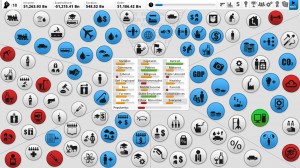
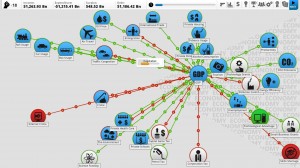
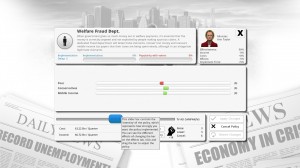
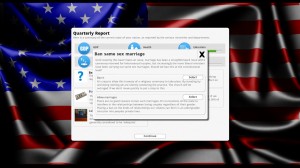
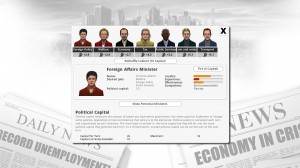
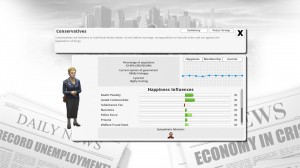
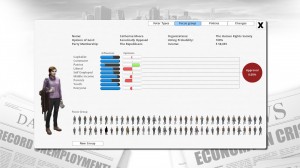
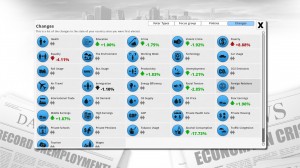
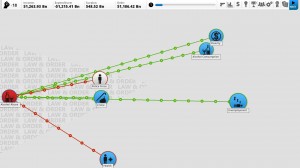
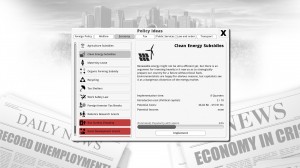

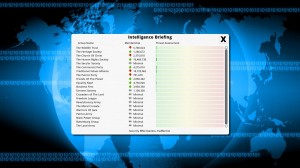

Leave a Reply